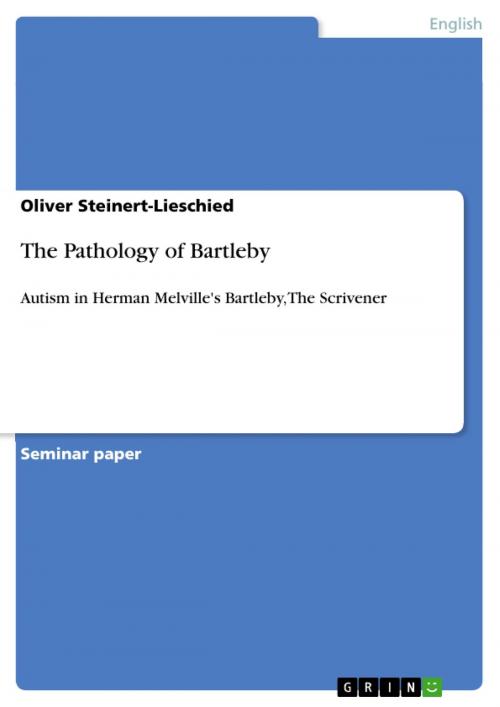The Pathology of Bartleby
Autism in Herman Melville's Bartleby, The Scrivener
Nonfiction, Entertainment, Drama, Anthologies| Author: | Oliver Steinert-Lieschied | ISBN: | 9783640561070 |
| Publisher: | GRIN Publishing | Publication: | March 10, 2010 |
| Imprint: | GRIN Publishing | Language: | English |
| Author: | Oliver Steinert-Lieschied |
| ISBN: | 9783640561070 |
| Publisher: | GRIN Publishing |
| Publication: | March 10, 2010 |
| Imprint: | GRIN Publishing |
| Language: | English |
Seminar paper from the year 2006 in the subject American Studies - Literature, grade: 1,4, University of Göttingen, language: English, abstract: When Melville wrote 'Bartleby, The Scrivener', he was in a state of intense despair and a feeling of rejection had come over him because his former works such as 'Moby Dick' and 'Pierre' had not received the attention and appreciation he had expected. Many critics consider Melville's failure to reach the contemporary readership to have influenced his later works such as the 'Piazza Tales' (Dan McCall, The Silence Of Bartleby., p. 38). Some even regard the figure of Bartleby as a personification of the author (Robert Rogers, A Psychoanalytic Reading Of The Double In Literature. Detroit/Michigan: Wayne State Univ. Press, 1970, p. 67-68). Most critics agree that Bartleby is one of the most interesting characters of nineteenth century literature, also from a psychological point of view. In contrast to religious, philological or other approaches, psychoanalytic criticism is an especially anachronistic approach: Melville did not have the means of modern psychology to describe and explain such illnesses as schizophrenia, autism and similar personality disorders. 'Bartleby, The Scrivener' is a fictional work of art while a psychological explanation of Bartleby's illness is scientific. In psychoanalytic criticism there are three possible objects of analysis: The author (a so-called psycho-biographical approach), the fictional characters and the readership (Oxford Encycl 823). My main focus will be on the figure of Bartleby along with the narrator who is considered by some critics to be a 'psychological double' of Bartleby and vice-versa (Rogers, Psychological Double, p. 67). Firstly, I will draw a rough summary of the transition from moral philosophy to psychology and situate Melville in that historical context and show how this influenced his worldview and accordingly, his works. Then I will make brief definitions of the mental illnesses schizophrenia and autistic disorder which are relevant for my textual analysis. The main body of this work will be the textual (psycho-)analysis of 'Bartleby, The Scrivener', where I will try to determine in how far Bartleby is mentally ill, how Melville reflects this fact in his language and imagery and which role the narrator plays in this context.
Seminar paper from the year 2006 in the subject American Studies - Literature, grade: 1,4, University of Göttingen, language: English, abstract: When Melville wrote 'Bartleby, The Scrivener', he was in a state of intense despair and a feeling of rejection had come over him because his former works such as 'Moby Dick' and 'Pierre' had not received the attention and appreciation he had expected. Many critics consider Melville's failure to reach the contemporary readership to have influenced his later works such as the 'Piazza Tales' (Dan McCall, The Silence Of Bartleby., p. 38). Some even regard the figure of Bartleby as a personification of the author (Robert Rogers, A Psychoanalytic Reading Of The Double In Literature. Detroit/Michigan: Wayne State Univ. Press, 1970, p. 67-68). Most critics agree that Bartleby is one of the most interesting characters of nineteenth century literature, also from a psychological point of view. In contrast to religious, philological or other approaches, psychoanalytic criticism is an especially anachronistic approach: Melville did not have the means of modern psychology to describe and explain such illnesses as schizophrenia, autism and similar personality disorders. 'Bartleby, The Scrivener' is a fictional work of art while a psychological explanation of Bartleby's illness is scientific. In psychoanalytic criticism there are three possible objects of analysis: The author (a so-called psycho-biographical approach), the fictional characters and the readership (Oxford Encycl 823). My main focus will be on the figure of Bartleby along with the narrator who is considered by some critics to be a 'psychological double' of Bartleby and vice-versa (Rogers, Psychological Double, p. 67). Firstly, I will draw a rough summary of the transition from moral philosophy to psychology and situate Melville in that historical context and show how this influenced his worldview and accordingly, his works. Then I will make brief definitions of the mental illnesses schizophrenia and autistic disorder which are relevant for my textual analysis. The main body of this work will be the textual (psycho-)analysis of 'Bartleby, The Scrivener', where I will try to determine in how far Bartleby is mentally ill, how Melville reflects this fact in his language and imagery and which role the narrator plays in this context.















